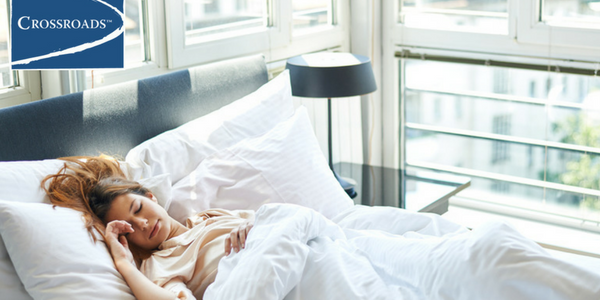Getting an adequate amount of sleep is essential for feeling rested and energized for the day. It’s a time for your body to relax and repair itself. If you have trouble sleeping or deal with insomnia, you know how frustrating disrupted sleep can be. This leads some people to turn to alcohol as a quick solution to help them fall asleep. Alcohol can help you to feel more calm and drowsy, allowing you to drift off to sleep.
However, drinking before bed can actually make your sleep worse, not better. Though you fall asleep faster, your body does not get as much quality REM time as it needs. This is the period of time that is believed to be most restorative, but alcohol disrupts these cycles. You sleep more soundly for the first part of the night, but then your sleep becomes lighter and more restless. You may find that you’re up a few times using the bathroom or just stirring in general.
As a result, the next morning you may find that you feel more tired and lethargic, and you may have trouble concentrating. That is because your body and mind were not able to rest as much as you thought. Even though you fell asleep shortly after you laid down, the alcohol was taking its toll and interfering with the quality and quantity of your sleep.
Creating Healthier Nighttime Routines
If you have trouble sleeping, alcohol is the not the answer. It is only a quick fix. But once you’ve become reliant on this method, changing your ways can be tough. The same is true if you’re in recovery; once your body is free from the effects of alcohol, you have to find other ways to get a good night’s sleep.
Here are a few strategies that may help you when it comes to falling – and staying – asleep:
- Avoid drinking caffeine or stimulating beverages within a few hours of when you plan to go to bed.
- Make sure you get plenty of exercise during the day so you feel more tired at night, but try not to exercise too close to bedtime as it can actually make you feel more awake.
- Establish a nighttime routine. Try to go to bed and wake up at the same time every day to get your body used to this pattern. Only use the bedroom for sleeping so your mind does not associate it with work or other activities.
- Keep the temperature cool and the room dark. This can create a better environment for sleeping with fewer disruptions. Avoid having the glow of electronics or other lights keeping you up.
- Leave yourself time to unwind before bed. Instead of immediately shutting down, spend some time relaxing with a good book, meditating, or journaling before you go to bed. Put down the electronics and turn off the television at least 30 minutes before you plan to go to sleep.
Sleep is an important part of addiction recovery and of a healthy lifestyle. As you get your body into a sleep routine, you’ll find that you wake up feeling more refreshed and energized to tackle the day ahead. Try a few different strategies to figure out what works best for you. If alcohol use has become problematic and you’re having trouble stopping, entering an addiction treatment program at Crossroads can help. Take back control and remember who you wanted to be by overcoming addiction and developing healthier habits.
[cta]If you are seeing signs of alcoholism and your alcohol use has become problematic and is affecting your sleep and quality of life, contact Crossroads today.[/cta]


















